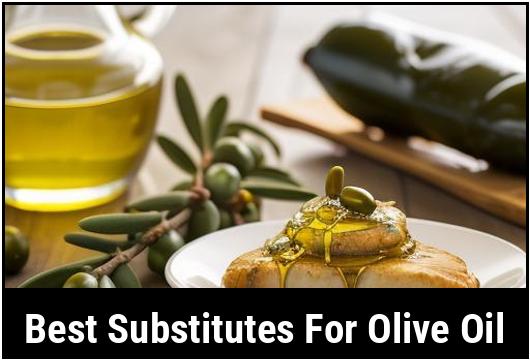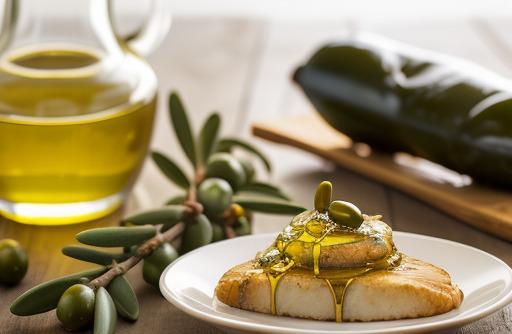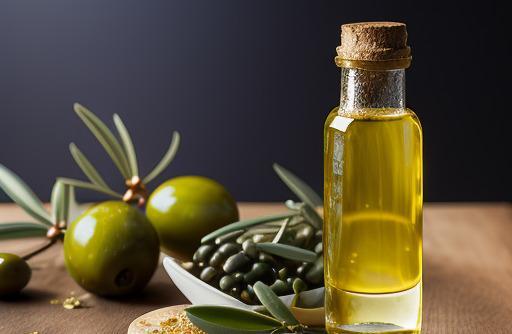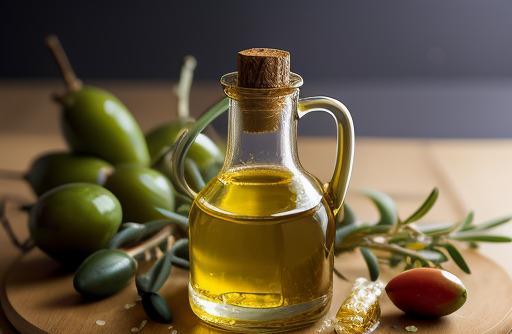- You are here:
- Home »
- Food Substitutes
- » Best Substitutes For Olive Oil
Best Substitutes For Olive Oil

Olive oil is a versatile and widely used cooking oil that is loved for its rich flavor and numerous health benefits. However, there may be times when you run out of olive oil or want to explore other options. Luckily, there are several excellent substitutes for olive oil that can be used in a variety of dishes, from sautéing vegetables to baking. In this article, we will discuss the best substitutes for olive oil, how to choose the right one, cooking tips, and even share some delicious recipes.
Key Takeaways
- Olive oil is a popular cooking oil known for its rich flavor and health benefits.
- There are several substitutes for olive oil that can be used in cooking and baking.
- When choosing a substitute for olive oil, consider the flavor profile and smoke point.
- Cooking with substitutes for olive oil requires some adjustments in temperature and quantity.
- Some of the best substitutes for olive oil include avocado oil, coconut oil, and grapeseed oil.
Why You Need A Substitute For Olive Oil
There can be various reasons why you might need a substitute for olive oil. Here are a few common situations:
-
Running Out of Olive Oil: You may find yourself in the middle of cooking and run out of olive oil. Instead of rushing to the store, having a substitute on hand can save you time and ensure you can continue cooking without interruption.
-
Dietary Restrictions or Preferences: If you have dietary restrictions, such as being allergic to olives or following a specific diet that doesn’t allow for olive oil, you may need to find a suitable substitute. Additionally, some people may simply prefer the taste of other oils and want to experiment with different flavors.
-
Exploring Different Flavors: While olive oil is known for its distinct flavor, using substitutes can introduce new and exciting flavors to your cooking. Trying out different oils can add depth and complexity to your dishes, expanding your culinary horizons.
Types Of Substitutes For Olive Oil

When looking for a substitute for olive oil, it’s essential to consider the flavor profile, smoke point, and health benefits of the alternative oils. Here are some common types of substitutes for olive oil:
-
Avocado Oil: Avocado oil is an excellent substitute for olive oil due to its relatively mild, buttery flavor. It has a high smoke point, making it suitable for high-heat cooking methods such as sautéing and stir-frying. Avocado oil also shares some similar health benefits to olive oil, including being rich in monounsaturated fats.
-
Coconut Oil: Coconut oil is a popular substitute for olive oil, especially in baking recipes. It has a subtly sweet and nutty flavor that can add a unique twist to your dishes. However, it’s worth noting that coconut oil has a lower smoke point compared to olive oil, so it’s best used in lower heat cooking or for added flavor in dressings and sauces.
-
Grapeseed Oil: Grapeseed oil is a neutral-flavored oil extracted from grape seeds. It has a high smoke point, making it suitable for various cooking methods, including frying and roasting. Grapeseed oil is also known for its light texture, making it a good choice for salad dressings and marinades.
-
Canola Oil: Canola oil is another versatile substitute for olive oil, thanks to its neutral flavor and high smoke point. It is often used in baking, frying, and sautéing due to its ability to withstand high temperatures without breaking down. Canola oil is also low in saturated fat and contains omega-3 fatty acids.
-
Sunflower Oil: Sunflower oil is derived from sunflower seeds and has a mild flavor that won’t overpower your dishes. It has a high smoke point, making it suitable for deep frying and high-heat cooking. Sunflower oil is also rich in vitamin E and low in saturated fat.
Best Substitutes For Olive Oil

Choosing the right substitute for olive oil depends on the specific dish you are cooking and your personal preferences. Here are some of the best substitutes for olive oil and their recommended uses:
-
Avocado Oil: Best used for sautéing, stir-frying, grilling, and baking. It works particularly well in recipes where you want a mild, buttery flavor. Avocado oil can also be used as a base for salad dressings and marinades.
-
Coconut Oil: Excellent for baking and adding a subtle sweetness to dishes. It pairs well with tropical flavors and can be used in cakes, cookies, and even as a topping for popcorn. Due to its lower smoke point, coconut oil is not recommended for high-heat cooking methods.
-
Grapeseed Oil: A versatile oil suitable for frying, roasting, grilling, and sautéing. It is particularly useful when you want a neutral flavor that won’t interfere with the other ingredients in your dish. It can also be used as a base for homemade mayonnaise and salad dressings.
-
Canola Oil: Ideal for baking, frying, sautéing, and making dressings. Canola oil’s neutral flavor allows the other ingredients in your recipe to shine. It is a versatile oil that can handle high temperatures without breaking down.
-
Sunflower Oil: Suitable for frying, deep-frying, and roasting. Its mild flavor makes it compatible with a wide range of dishes. Sunflower oil can also be used as a substitute for butter or vegetable oil in recipes.
Choosing The Right Substitute For Olive Oil

When selecting a substitute for olive oil, consider the following factors:
-
Flavor: Olive oil has a distinctive flavor that ranges from fruity to peppery. If you want to maintain a similar taste profile, choose an oil with a similar flavor, such as avocado oil. If you prefer a milder or neutral taste, go for oils like canola or grapeseed.
-
Smoke Point: The smoke point of an oil is the temperature at which it starts to smoke and break down, releasing harmful compounds and producing an unpleasant taste. If you’re using the substitute for high-heat cooking methods like frying or searing, choose an oil with a high smoke point, such as avocado or grapeseed oil. For baking or lower heat cooking, oils like coconut or canola will work well.
-
Health Benefits: Consider the health benefits of the substitute oil. Olive oil is known for its heart-healthy monounsaturated fats and antioxidants. Some substitutes like avocado oil and canola oil also offer similar health benefits, while coconut oil has its own unique properties. If you have specific dietary requirements or preferences, choose a substitute that aligns with them.
-
Availability and Cost: Availability and cost can also be factors in choosing a substitute for olive oil. Some oils may be more readily available or affordable in your region. Consider these factors when making your decision.
Cooking With Substitutes For Olive Oil

When cooking with substitutes for olive oil, it’s important to note that some adjustments may be needed in terms of temperature and quantity. Here are some tips to help you successfully cook with these substitutes:
-
Temperature Adjustments: Different oils have different smoke points, which means they can withstand different cooking temperatures. If you’re substituting olive oil with an oil that has a lower smoke point, such as coconut oil, reduce the cooking temperature slightly to prevent the oil from smoking. On the other hand, if you’re using an oil with a higher smoke point, such as grapeseed oil, you can increase the temperature slightly without issue.
-
Quantity Adjustments: Substituting oils may require adjustments in the quantity used. For instance, avocado oil has a richer consistency than olive oil, so you may need to use less when sautéing or frying. On the other hand, coconut oil is solid at room temperature, so if you’re substituting it for olive oil in a baking recipe that calls for melted oil, be sure to melt the coconut oil first and adjust the quantity accordingly.
-
Flavor Enhancements: Keep in mind that each substitute oil brings its own unique flavor to the dish. Adjustments may need to be made to balance the flavors appropriately. For example, if you’re using coconut oil in a savory dish, you may want to add a pinch of salt or other seasonings to counterbalance the sweetness.
-
Experiment and Learn: Cooking is an art, and using substitutes for olive oil provides an opportunity to experiment with different flavors and techniques. Don’t be afraid to try new combinations and adjust recipes to your liking. Each substitute has its own characteristics that can enhance your culinary creations.
Pro Tip: When using coconut oil as a substitute for olive oil in baking, chill the coconut oil in the refrigerator beforehand to solidify it. This will make it easier to measure and incorporate into the recipe.
Recipes Using Substitutes For Olive Oil

- Avocado Oil Guacamole:
-
Ingredients:
- 3 ripe avocados
- 1 lime, juiced
- 1/4 cup finely chopped red onion
- 1/4 cup chopped fresh cilantro
- 1 small jalapeno, seeded and minced
- Salt and pepper to taste
- Tortilla chips for serving
-
Instructions:
- Cut the avocados in half, remove the pit, and scoop out the flesh into a bowl.
- Mash the avocados with a fork until you achieve your desired consistency.
- Stir in the lime juice, red onion, cilantro, jalapeno, salt, and pepper.
- Adjust the seasoning to taste.
- Serve with tortilla chips.
- Coconut Oil Chocolate Chip Cookies:
-
Ingredients:
- 1/2 cup coconut oil, melted
- 3/4 cup brown sugar
- 1/4 cup granulated sugar
- 1 egg
- 2 teaspoons vanilla extract
- 2 cups all-purpose flour
- 1 teaspoon baking soda
- 1/2 teaspoon salt
- 1 1/2 cups chocolate chips
-
Instructions:
- Preheat the oven to 350°F (175°C) and line a baking sheet with parchment paper.
- In a large mixing bowl, combine the melted coconut oil, brown sugar, and granulated sugar. Mix until well combined.
- Beat in the egg and vanilla extract.
- In a separate bowl, whisk together the flour, baking soda, and salt.
- Gradually add the dry ingredients to the wet ingredients, mixing until just combined.
- Stir in the chocolate chips.
- Drop spoonfuls of dough onto the prepared baking sheet, spacing them about 2 inches apart.
- Bake for 10-12 minutes or until the edges are golden brown.
- Allow the cookies to cool on the baking sheet for a few minutes before transferring them to a wire rack.
Storage And Shelf Life Of Substitutes

The storage and shelf life of substitute oils for olive oil vary depending on the type of oil. Here are some general guidelines:
-
Avocado Oil: Store avocado oil in a cool, dark place, away from direct sunlight. It can be refrigerated to extend its shelf life. Unopened avocado oil can last up to one year, while opened bottles should be consumed within a few months for optimal freshness.
-
Coconut Oil: Coconut oil has a long shelf life due to its high saturated fat content. It can be stored at room temperature, but it may solidify or liquefy depending on the temperature. Unopened coconut oil can last up to two years, while opened containers should be used within a year.
-
Grapeseed Oil: Grapeseed oil can be stored in a cool, dark place. It is best to use it within six months to maintain its freshness and flavor.
-
Canola Oil: Canola oil can be stored in a cool, dry place away from direct sunlight. Unopened bottles can last up to two years, while opened containers should be consumed within six months to a year.
-
Sunflower Oil: Sunflower oil should be stored in a cool, dark place. Unopened bottles can last up to two years, while opened containers should be used within six months to a year.
Ensure that the oils are stored in airtight containers to prevent oxidation and maintain their quality for as long as possible.
Conclusion
While olive oil is a beloved cooking oil, there are numerous substitutes available that can add unique flavors and cooking options to your culinary repertoire. Whether you’re looking for a healthier alternative or simply want to try something new, avocado oil, coconut oil, grapeseed oil, canola oil, and sunflower oil are all excellent options. Consider the flavor profile and smoke point when choosing a substitute, and don’t be afraid to experiment with different recipes and techniques. With these substitutes, you can continue creating delicious meals without missing a beat.
FAQS
What Are Some Of The Best Substitutes For Olive Oil?
If you’re looking for a healthy replacement for olive oil, you can try avocado oil. It contains the same monounsaturated fats as olive oil, which can benefit your heart health. Canola oil is another good alternative, as it’s rich in omega-3 fatty acids and low in saturated fat. If you want a more flavorful substitute for olive oil, you can use coconut oil or sesame oil. Both of these oils have a distinctive taste and aroma that can enhance the flavor of your dishes. Finally, if you want a light and neutral oil for cooking, you can use vegetable oil, which is extracted from plants like sunflowers, soybeans, and canola.
What Are The Health Benefits Of Avocado Oil As A Substitute For Olive Oil?
Avocado oil is a healthy alternative to olive oil because it contains the same heart-healthy monounsaturated fats, which can help lower your risk of heart disease. It’s also high in antioxidants, which can protect your cells from damage caused by free radicals. Additionally, avocado oil is rich in vitamin E, which can support skin and eye health.
Can Canola Oil Be Used As A Substitute For Olive Oil In Salad Dressings?
Yes, you can use canola oil as a substitute for olive oil in salad dressings. Canola oil has a mild flavor that won’t overpower the other ingredients, making it a perfect blend for dressings. Its light, neutral taste also makes it a good choice for baking.
What Are The Benefits Of Using Sesame Oil As A Substitute For Olive Oil?
Sesame oil is a flavorful substitute for olive oil that can enhance the taste of your dishes with its rich, nutty flavor. It’s also high in antioxidants, which can protect your cells against damage. Sesame oil is a good source of vitamins and minerals, including calcium, iron, and zinc, which are essential for maintaining healthy bones and strong teeth.
Is Coconut Oil A Good Substitute For Olive Oil For Cooking?
Yes, coconut oil is a popular replacement for olive oil in cooking, especially for high-heat cooking methods like frying and roasting. It has a high smoke point and can withstand high temperatures without breaking down, making it a better choice for cooking than olive oil. Coconut oil also contains medium-chain triglycerides (MCTs), which can boost energy and promote weight loss. However, it’s important to note that coconut oil is high in saturated fats, so it should be consumed in moderation.
Sources
About the Author Jenny
I'm Jenny, a housewife with an unwavering passion for food. My culinary journey began with my grandmother's kitchen, and it's now a full-fledged food blog. I've turned my love for cooking into a creative outlet, sharing recipes and stories with a global community of fellow food enthusiasts. It's proof that being a housewife can also mean pursuing your passions and savoring life's delectable moments.
